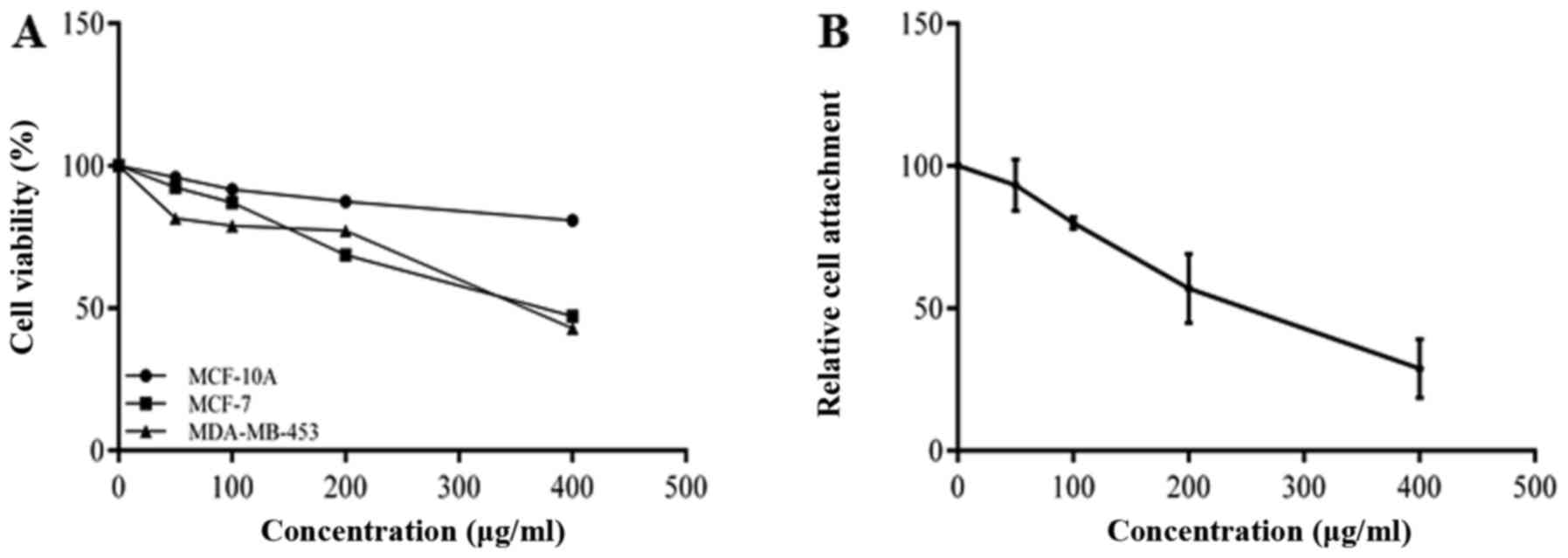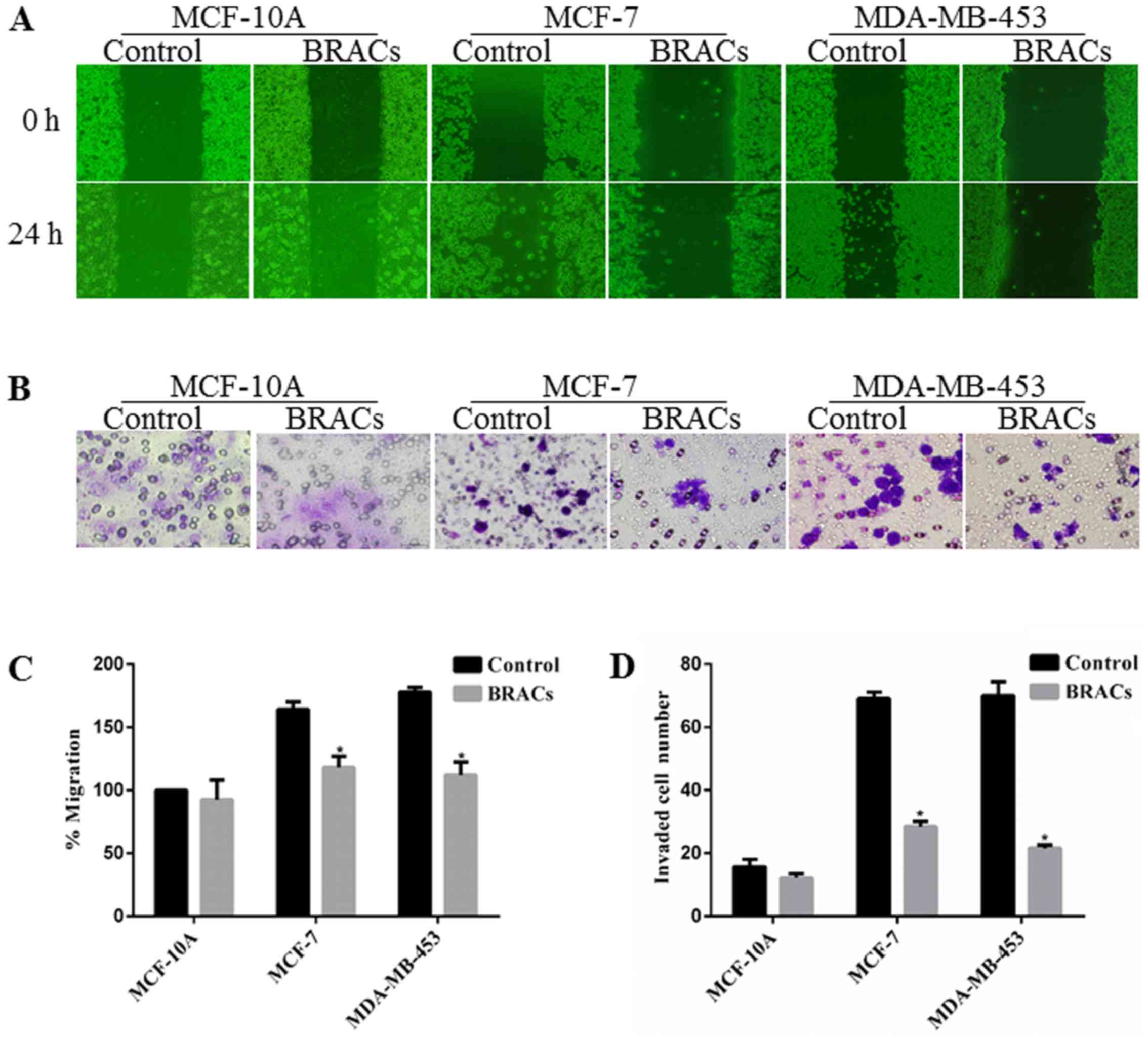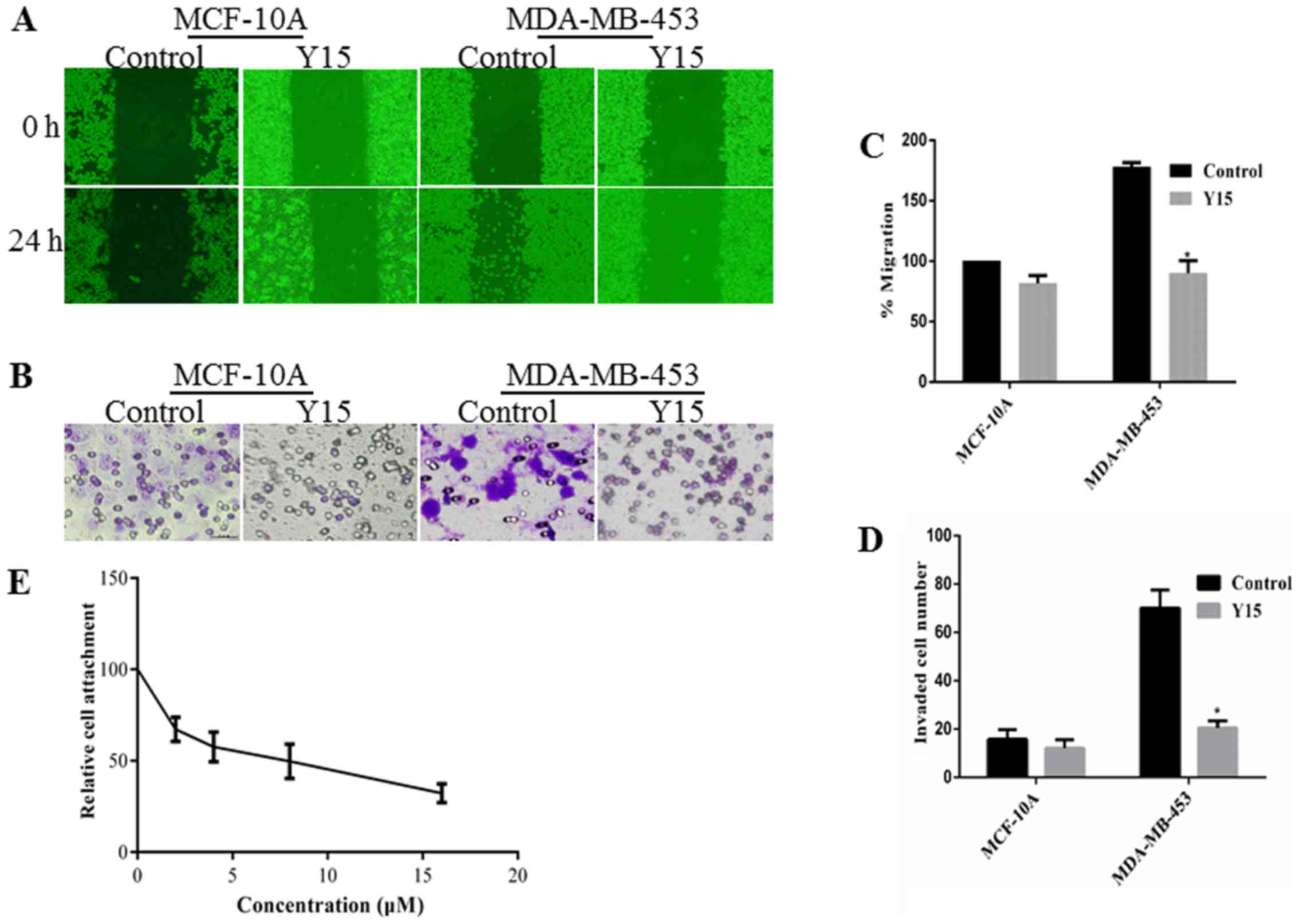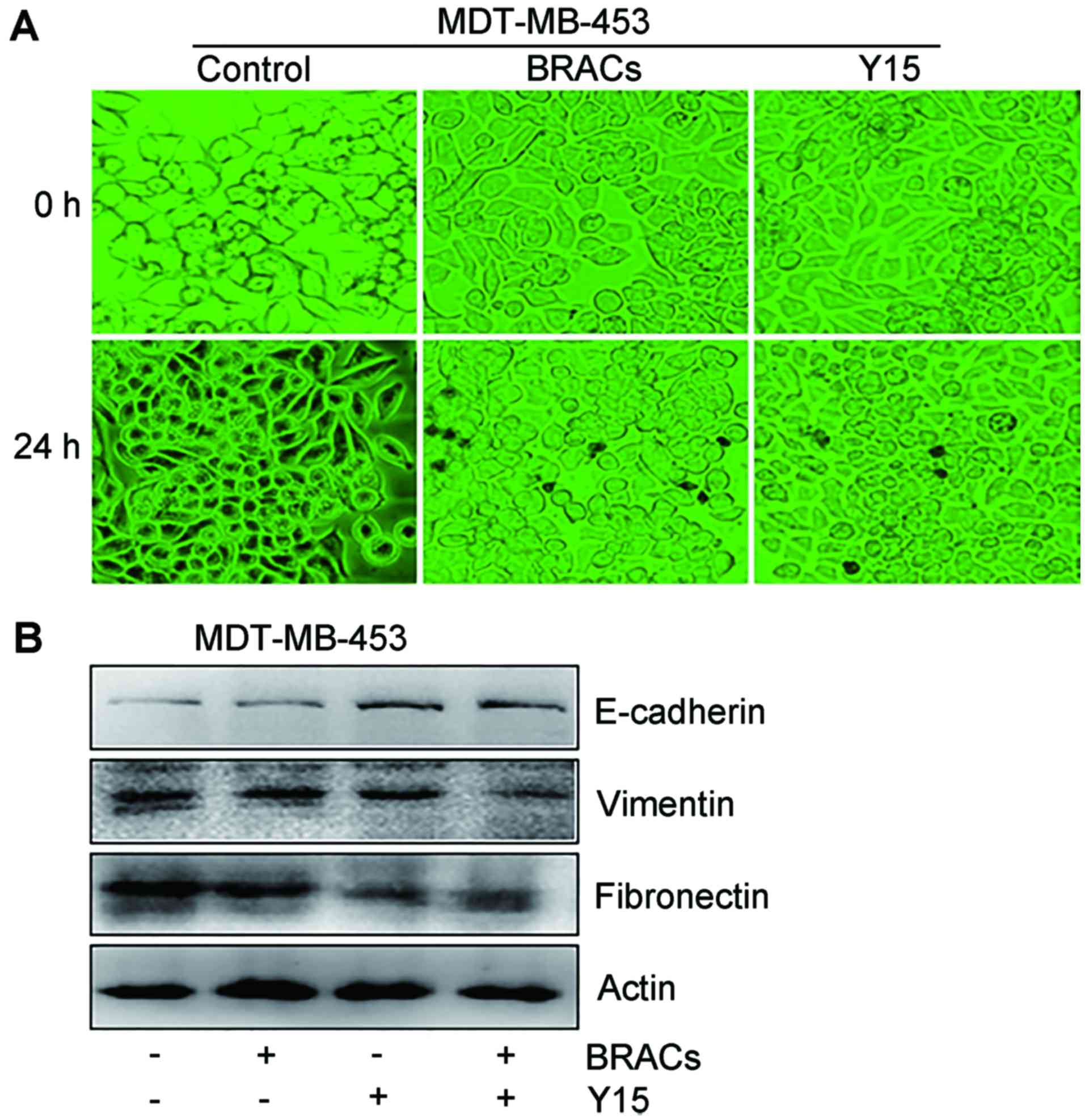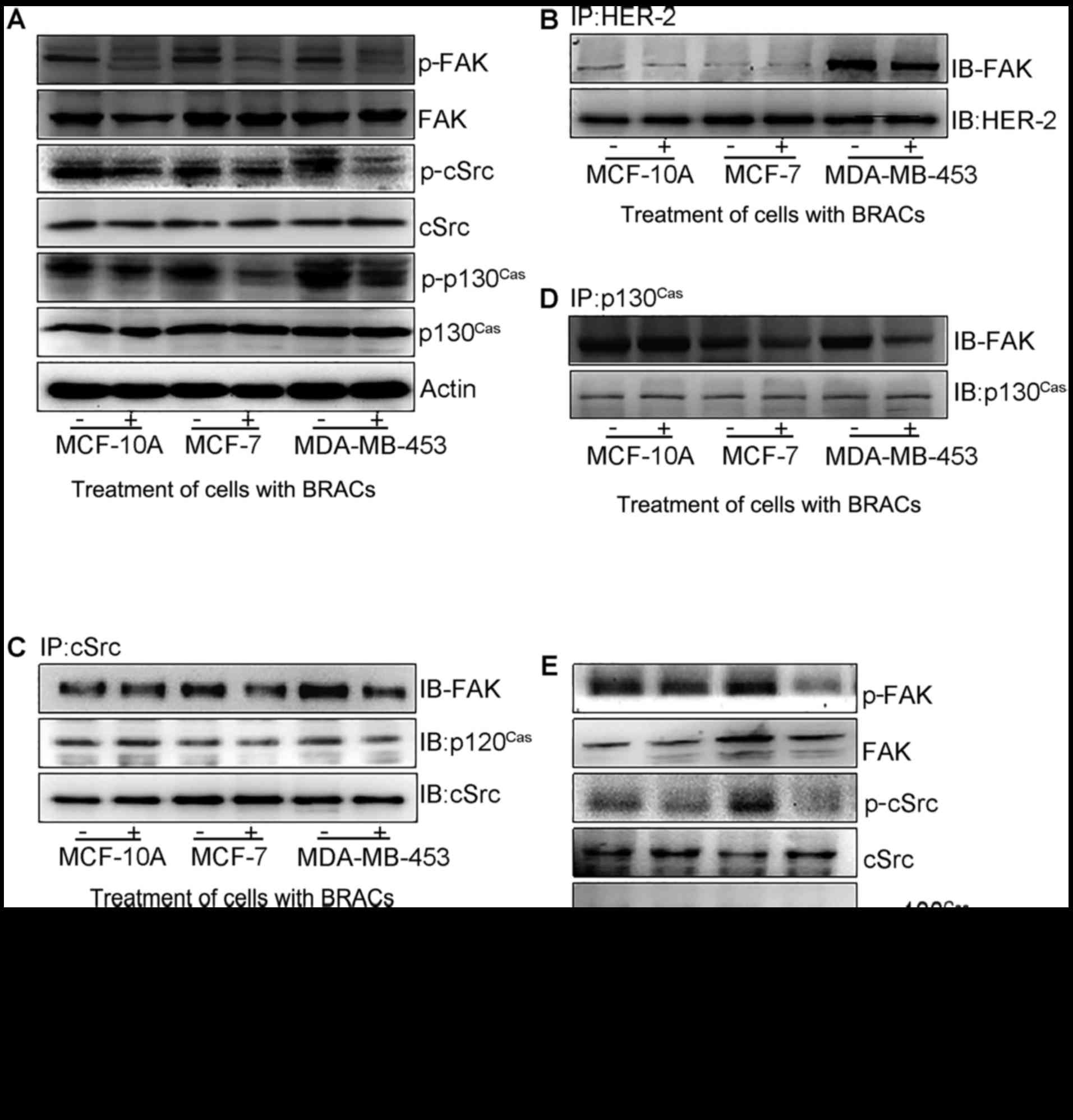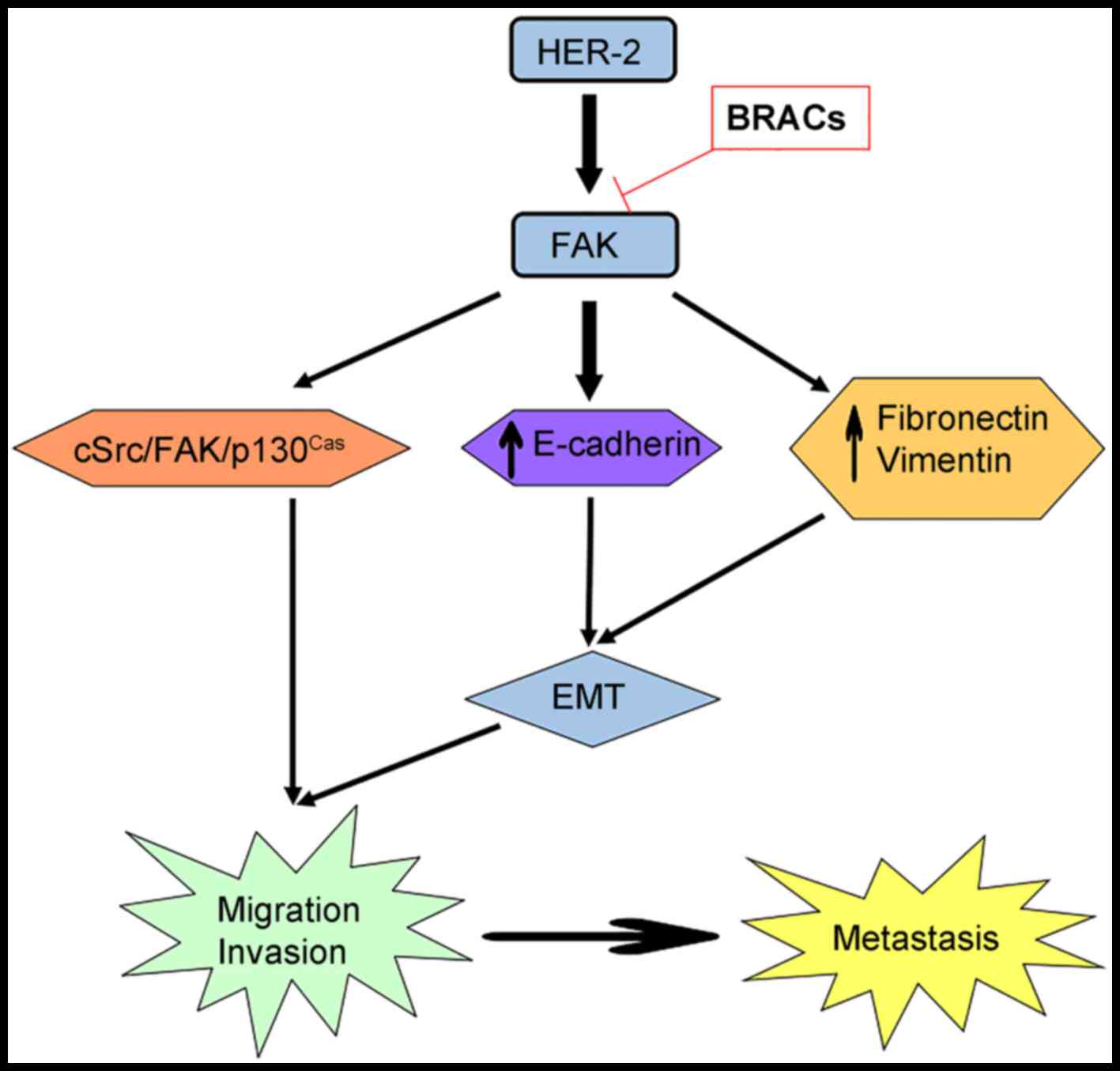|
1
|
Friedenreich CM: Physical activity and
breast cancer: Review of the epidemiologic evidence and biologic
mechanisms. Recent Results Cancer Res. 188:125–139. 2011.
View Article : Google Scholar : PubMed/NCBI
|
|
2
|
Zheng L, Zhou B, Meng X, Zhu W, Zuo A,
Wang X, Jiang R and Yu S: A model of spontaneous mouse mammary
tumor for human estrogen receptor- and progesterone
receptor-negative breast cancer. Int J Oncol. 45:2241–2249. 2014.
View Article : Google Scholar : PubMed/NCBI
|
|
3
|
Jemal A, Bray F, Center MM, Ferlay J, Ward
E and Forman D: Global cancer statistics. CA Cancer J Clin.
61:69–90. 2011. View Article : Google Scholar : PubMed/NCBI
|
|
4
|
Mendoza G, Portillo A and Olmos-Soto J:
Accurate breast cancer diagnosis through real-time PCR her-2 gene
quantification using immunohistochemically-identified biopsies.
Oncol Lett. 5:295–298. 2013.
|
|
5
|
Gutierrez C and Schiff R: HER2: Biology,
detection, and clinical implications. Arch Pathol Lab Med.
135:55–62. 2011.PubMed/NCBI
|
|
6
|
Slamon DJ, Godolphin W, Jones LA, Holt JA,
Wong SG, Keith DE, Levin WJ, Stuart SG, Udove J, Ullrich A, et al:
Studies of the HER-2/neu proto-oncogene in human breast and ovarian
cancer. Science. 244:707–712. 1989. View Article : Google Scholar : PubMed/NCBI
|
|
7
|
Heerboth S, Housman G, Leary M, Longacre
M, Byler S, Lapinska K, Willbanks A and Sarkar S: EMT and tumor
metastasis. Clin Transl Med. 4:62015. View Article : Google Scholar : PubMed/NCBI
|
|
8
|
Heffler M, Golubovskaya VM, Dunn KM and
Cance W: Focal adhesion kinase autophosphorylation inhibition
decreases colon cancer cell growth and enhances the efficacy of
chemotherapy. Cancer Biol Ther. 14:761–772. 2013. View Article : Google Scholar : PubMed/NCBI
|
|
9
|
Golubovskaya VM: Targeting FAK in human
cancer: From finding to first clinical trials. Front Biosci
(Landmark Ed). 19:687–706. 2014. View
Article : Google Scholar
|
|
10
|
Vadlamudi RK, Sahin AA, Adam L, Wang RA
and Kumar R: Heregulin and HER2 signaling selectively activates
c-Src phosphorylation at tyrosine 215. FEBS Lett. 543:76–80. 2003.
View Article : Google Scholar : PubMed/NCBI
|
|
11
|
Dolfi F, Garcia-Guzman M, Ojaniemi M,
Nakamura H, Matsuda M and Vuori K: The adaptor protein Crk connects
multiple cellular stimuli to the JNK signaling pathway. Proc Natl
Acad Sci USA. 95:15394–15399. 1998. View Article : Google Scholar : PubMed/NCBI
|
|
12
|
Han C, Ding H, Casto B, Stoner GD and
D'Ambrosio SM: Inhibition of the growth of premalignant and
malignant human oral cell lines by extracts and components of black
raspberries. Nutr Cancer. 51:207–217. 2005. View Article : Google Scholar : PubMed/NCBI
|
|
13
|
Fayyaz S, Aydin T, Cakir A, Gasparri ML,
Panici PB and Farooqi AA: Oleuropein mediated targeting of
signaling network in cancer. Curr Top Med Chem. 16:2477–2483. 2016.
View Article : Google Scholar : PubMed/NCBI
|
|
14
|
Farooqi AA, Wang Z, Hasnain S, Attar R,
Aslam A, Mansoor Q and Ismail M: Citrus fruits and their bioactive
ingredients: Leading four horsemen from front. Asian Pac J Cancer
Prev. 16:2575–2580. 2015. View Article : Google Scholar : PubMed/NCBI
|
|
15
|
Lin X, Farooqi AA and Ismail M: Recent
progress in fungus-derived bioactive agents for targeting of
signaling machinery in cancer cells. Drug Des Devel Ther.
9:1797–1804. 2015.PubMed/NCBI
|
|
16
|
Perk AA, Shatynska-Mytsyk I, Gerçek YC,
Boztaş K, Yazgan M, Fayyaz S and Farooqi AA: Rutin mediated
targeting of signaling machinery in cancer cells. Cancer Cell Int.
14:1242014. View Article : Google Scholar : PubMed/NCBI
|
|
17
|
Attar R, Tabassum S, Fayyaz S, Ahmad MS,
Nogueira DR, Yaylim I, Timirci-Kahraman O, Kucukhuseyin O, Cacina
C, Farooqi AA, et al: Natural products are the future of anticancer
therapy: Preclinical and clinical advancements of Viscum album
phytometabolites. Cell Mol Biol (Noisy-le-grand). 61:62–68.
2015.
|
|
18
|
Kong S, Kim DJ, Oh SK, Choi IS, Jeong HS
and Lee J: Black rice bran as an ingredient in noodles: Chemical
and functional evaluation. J Food Sci. 77:C303–C307. 2012.
View Article : Google Scholar : PubMed/NCBI
|
|
19
|
Sehitoglu MH, Farooqi AA, Qureshi MZ, Butt
G and Aras A: Anthocyanins: Targeting of signaling networks in
cancer cells. Asian Pac J Cancer Prev. 15:2379–2381. 2014.
View Article : Google Scholar : PubMed/NCBI
|
|
20
|
Hui C, Bin Y, Xiaoping Y, Long Y, Chunye
C, Mantian M and Wenhua L: Anticancer activities of an
anthocyanin-rich extract from black rice against breast cancer
cells in vitro and in vivo. Nutr Cancer. 62:1128–1136. 2010.
View Article : Google Scholar : PubMed/NCBI
|
|
21
|
Luo LP, Han B, Yu XP, Chen XY, Zhou J,
Chen W, Zhu YF, Peng XL, Zou Q and Li SY: Anti-metastasis activity
of black rice anthocyanins against breast cancer: Analyses using an
ErbB2 positive breast cancer cell line and tumoral xenograft model.
Asian Pac J Cancer Prev. 15:6219–6225. 2014. View Article : Google Scholar : PubMed/NCBI
|
|
22
|
Chen XY, Zhou J, Luo LP, Han B, Li F, Chen
JY, Zhu YF, Chen W and Yu XP: Black Rice Anthocyanins Suppress
Metastasis of Breast Cancer Cells by Targeting RAS/RAF/MAPK
Pathway. Biomed Res Int. 2015:4142502015. View Article : Google Scholar : PubMed/NCBI
|
|
23
|
Xu M, Bower KA, Wang S, Frank JA, Chen G,
Ding M, Wang S, Shi X, Ke Z and Luo J: Cyanidin-3-glucoside
inhibits ethanol-induced invasion of breast cancer cells
overexpressing ErbB2. Mol Cancer. 9:2852010. View Article : Google Scholar : PubMed/NCBI
|
|
24
|
Xu M, Bower KA, Chen G, Shi X, Dong Z, Ke
Z and Luo J: Ethanol enhances the interaction of breast cancer
cells over-expressing ErbB2 with fibronectin. Alcohol Clin Exp Res.
34:751–760. 2010. View Article : Google Scholar : PubMed/NCBI
|
|
25
|
Hou DX: Potential mechanisms of cancer
chemoprevention by anthocyanins. Curr Mol Med. 3:149–159. 2003.
View Article : Google Scholar : PubMed/NCBI
|
|
26
|
Crozier A, Jaganath IB and Clifford MN:
Dietary phenolics: Chemistry, bioavailability and effects on
health. Nat Prod Rep. 26:1001–1043. 2009. View Article : Google Scholar : PubMed/NCBI
|
|
27
|
Scalbert A and Williamson G: Dietary
intake and bioavailability of polyphenols. J Nutr. 130(Suppl 8):
2073S–2085S. 2000.PubMed/NCBI
|
|
28
|
Manach C, Scalbert A, Morand C, Rémésy C
and Jiménez L: Polyphenols: Food sources and bioavailability. Am J
Clin Nutr. 79:727–747. 2004.PubMed/NCBI
|
|
29
|
Kamiloglu S, Capanoglu E, Grootaert C and
Van Camp J: Anthocyanin absorption and metabolism by human
intestinal caco-2 cells - A review. Int J Mol Sci. 16:21555–21574.
2015. View Article : Google Scholar : PubMed/NCBI
|
|
30
|
Fang J: Bioavailability of anthocyanins.
Drug Metab Rev. 46:508–520. 2014. View Article : Google Scholar : PubMed/NCBI
|
|
31
|
Chen PN, Kuo WH, Chiang CL, Chiou HL,
Hsieh YS and Chu SC: Black rice anthocyanins inhibit cancer cells
invasion via repressions of MMPs and u-PA expression. Chem Biol
Interact. 163:218–229. 2006. View Article : Google Scholar : PubMed/NCBI
|
|
32
|
Wang LS and Stoner GD: Anthocyanins and
their role in cancer prevention. Cancer Lett. 269:281–290. 2008.
View Article : Google Scholar : PubMed/NCBI
|
|
33
|
Chen JS, Huang XH, Wang Q, Huang JQ, Zhang
LJ, Chen XL, Lei J and Cheng ZX: Sonic hedgehog signaling pathway
induces cell migration and invasion through focal adhesion
kinase/AKT signaling-mediated activation of matrix
metalloproteinase (MMP)-2 and MMP-9 in liver cancer.
Carcinogenesis. 34:10–19. 2013. View Article : Google Scholar
|
|
34
|
Golubovskaya VM, Nyberg C, Zheng M, Kweh
F, Magis A, Ostrov D and Cance WG: A small molecule inhibitor,
1,2,4,5-benzenetetraamine tetrahydrochloride, targeting the y397
site of focal adhesion kinase decreases tumor growth. J Med Chem.
51:7405–7416. 2008. View Article : Google Scholar : PubMed/NCBI
|
|
35
|
Veeraraghavan J, Natarajan M, Lagisetty P,
Awasthi V, Herman TS and Aravindan N: Impact of curcumin, raspberry
extract, and neem leaf extract on rel protein-regulated cell
death/radiosensitization in pancreatic cancer cells. Pancreas.
40:1107–1119. 2011. View Article : Google Scholar : PubMed/NCBI
|
|
36
|
Singh N, Zaidi D, Shyam H, Sharma R and
Balapure AK: Polyphenols sensitization potentiates susceptibility
of MCF-7 and MDA MB-231 cells to Centchroman. PLoS One.
7:e377362012. View Article : Google Scholar : PubMed/NCBI
|















